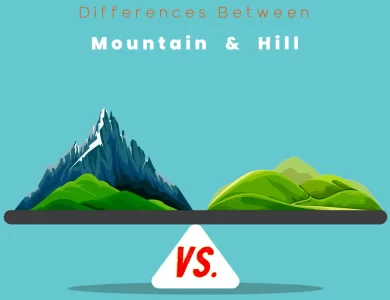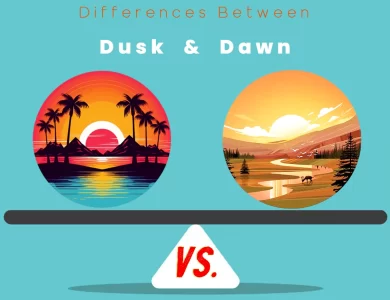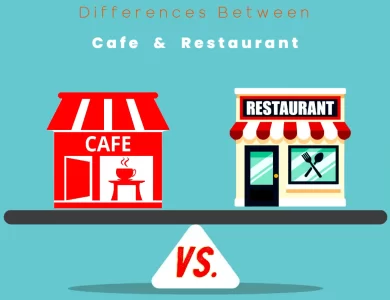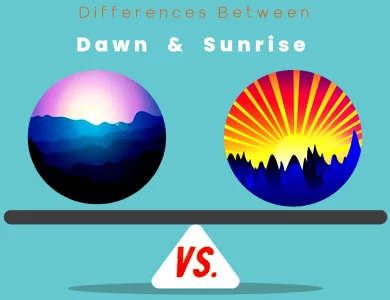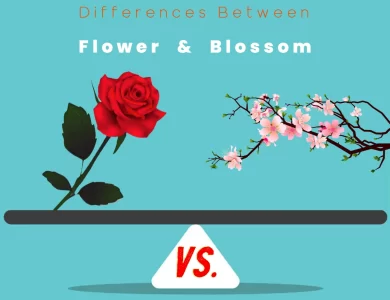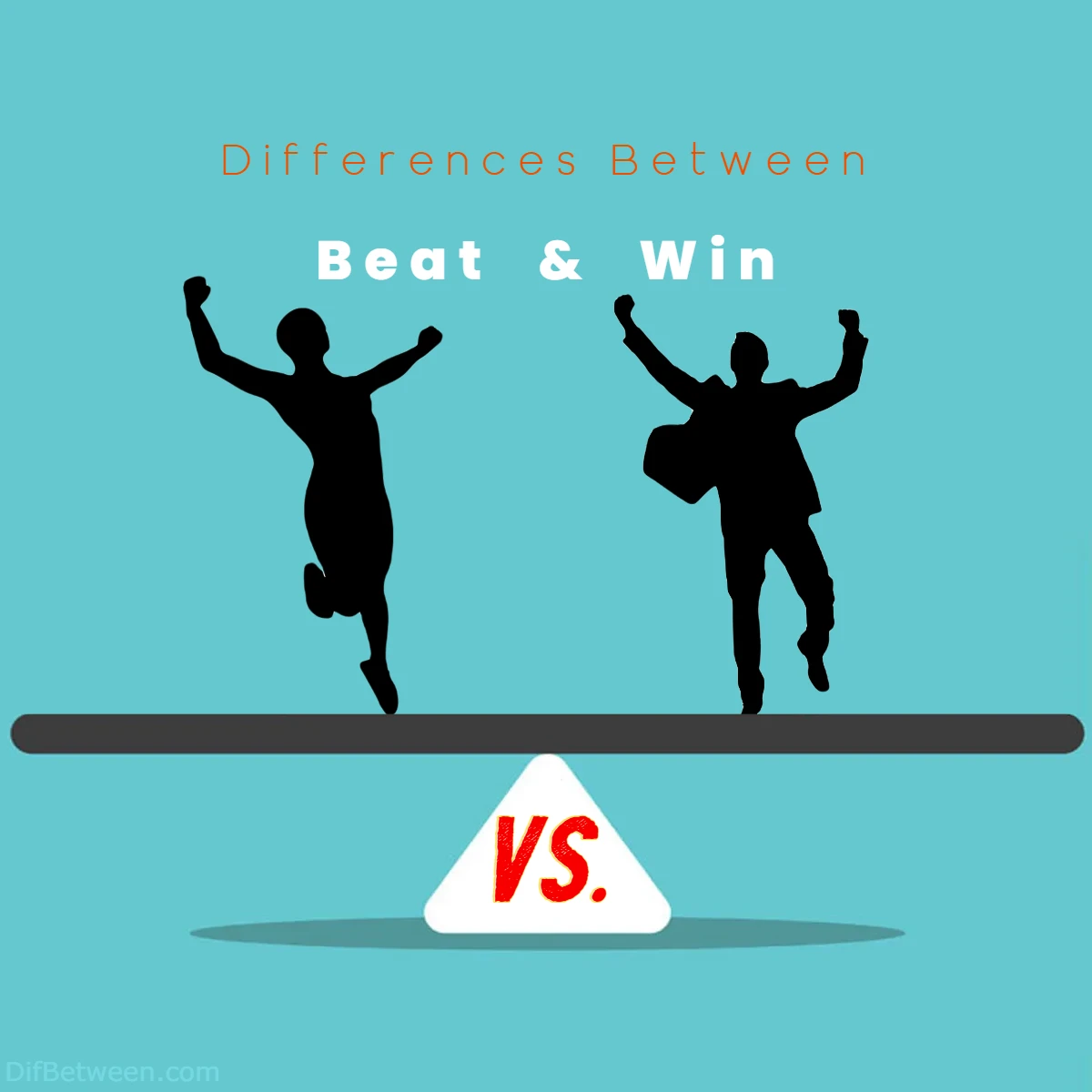
| Aspect | Beat | Win |
|---|---|---|
| Definition | Victory achieved through effort, skill, or strategy, often in a competitive context. | Emerging as the overall champion or victor in a competition or contest. |
| Usage in Competitive Sports | Emphasizes the process of competition, effort, and outperforming opponents. | Denotes the ultimate outcome of competition, declaring the victor. |
| Psychological Focus | Indicates overcoming personal obstacles or challenges. | Signifies achieving personal success, often a specific accomplishment. |
| Business and Marketing | Describes competitive advantage, emphasizing ongoing effort to surpass rivals. | Refers to achieving a dominant market position or specific goals. |
| Political and Social Context | Highlights defeating an opponent or opposing viewpoint in a competitive political landscape. | Signifies securing a political victory, often through majority votes or seats. |
| Everyday Conversation | Used for minor achievements and personal experiences. | Signifies significant or unexpected personal successes. |
| Academic Context | Seldom used academically, but may refer to overcoming academic challenges metaphorically. | Commonly used to describe academic awards, scholarships, and significant accomplishments. |
| Relationships and Personal Life | Signifies overcoming personal challenges, such as emotional setbacks or illnesses. | Often used for romantic or interpersonal achievements. |
| Cultural References | Associated with non-conformity, individualism, and rebellion against societal norms, as seen in the Beat Generation. | Often used for artistic, musical, or sports recognition and success. |
Understanding the subtle differences between these words can be a game-changer in your communication arsenal. From competitive sports to personal triumphs, from the business battleground to the world of academia, we’ll delve into a variety of contexts where these words play their distinct roles. Plus, you’ll discover how they intertwine with our daily lives, personal relationships, and even cultural references.
Differences Between Beat and Win
The main differences between “Beat” and “Win” lie in their connotations and contexts of usage. While “Beat” underscores the competitive process, effort, and outperforming of opponents, it often relates to personal growth or overcoming obstacles, as in conquering challenges in sports, psychology, and personal life. In contrast, “Win” focuses on the ultimate outcome, declaring victory in a competition, and is frequently associated with achieving success or recognition, whether in sports, business, or academia. Understanding these nuanced distinctions is key to using these words effectively across diverse domains.
Definition and Semantics
Beat:
The term “beat” primarily implies a competitive context where one individual, team, or entity surpasses or outperforms another. It suggests a victory achieved through effort, skill, or strategy. For instance, if a tennis player defeats their opponent, they “beat” them, indicating that they won the match.
Win:
On the other hand, “win” is a more general term denoting the act of emerging as the overall champion or victor in a competition or contest. Winning implies achieving success, often with a sense of finality. In a soccer tournament, the team that secures the championship title “wins” the tournament.
Usage in Competitive Sports
Beat in Sports
In competitive sports, “beat” is frequently employed to emphasize the process of overcoming an opponent. It highlights the action or effort involved in outperforming another team or athlete. When a team “beats” another in a soccer game, it means they have achieved a victory through skill, teamwork, and perhaps a better strategy. Let’s explore this concept in a tabular form:
| Aspect | Beat | Win |
|---|---|---|
| Emphasis | On the process of competition | On the outcome of the competition |
| Usage in Sports | “They beat their rivals 3-0.” | “They won the championship.” |
| Implies | Competitive effort | Successful outcome |
Win in Sports
Conversely, “win” is used more broadly to declare the overall victory in a tournament or championship. It focuses on the result rather than the actions that led to the result. When a runner “wins” a marathon, it signifies that they crossed the finish line first and secured the top position. Here’s a summary:
| Aspect | Beat | Win |
|---|---|---|
| Emphasis | On the process of competition | On the outcome of the competition |
| Usage in Sports | “They beat their rivals 3-0.” | “They won the championship.” |
| Implies | Competitive effort | Successful outcome |
Psychological Differences
Beat in Psychology
In psychology and personal development, the term “beat” often signifies overcoming challenges or personal obstacles. It relates to personal victories and triumphs in the face of adversity. When an individual talks about “beating” their fear of public speaking, it means they have successfully conquered that fear. Here’s a concise comparison:
| Aspect | Beat | Win |
|---|---|---|
| Psychological Focus | Overcoming personal obstacles | Achieving personal success |
| Example | “I beat my fear of heights.” | “I won the public speaking competition.” |
| Implies | Personal growth and achievement | Specific accomplishment |
Win in Psychology
In contrast, “win” in psychological contexts typically refers to achieving a specific, personal success or accomplishment. When a student says they “won” a scholarship, it means they successfully secured the scholarship award. The focus here is on achieving a specific goal. Let’s summarize the psychological nuances:
| Aspect | Beat | Win |
|---|---|---|
| Psychological Focus | Overcoming personal obstacles | Achieving personal success |
| Example | “I beat my fear of heights.” | “I won the public speaking competition.” |
| Implies | Personal growth and achievement | Specific accomplishment |
Business and Marketing
Beat in Business
In the business and marketing world, “beat” is often used to express a competitive advantage. Companies may aim to “beat” their competitors by offering superior products or services, pricing strategies, or marketing campaigns. This indicates a continuous effort to outperform rivals and gain a larger market share. A tabular overview:
| Aspect | Beat | Win |
|---|---|---|
| Business Focus | Competitive advantage over rivals | Achieving a dominant market position |
| Usage in Business | “Our product beats the competition.” | “We’ve won a significant market share.” |
| Implies | Continuous improvement and competition | Establishing market leadership |
Win in Business
Conversely, “win” in the business context refers to achieving a dominant market position or specific goals. When a company states they “won” a significant market share, it means they have successfully achieved a significant portion of the market, perhaps through strategic acquisitions or organic growth. Here’s a concise summary:
| Aspect | Beat | Win |
|---|---|---|
| Business Focus | Competitive advantage over rivals | Achieving a dominant market position |
| Usage in Business | “Our product beats the competition.” | “We’ve won a significant market share.” |
| Implies | Continuous improvement and competition | Establishing market leadership |
Political and Social Context
Beat in Politics
In politics and social discussions, “beat” is often used to convey the act of defeating an opponent or opposing viewpoint. When one political party “beats” another in an election, it means they secured more votes and emerged as the winner. This emphasizes the competitive nature of politics. Let’s summarize the political connotations:
| Aspect | Beat | Win |
|---|---|---|
| Political Focus | Defeating an opponent or opposing party | Securing a political victory |
| Usage in Politics | “The party beat their rivals in the election.” | “They won the majority of seats in the parliament.” |
| Implies | Competitive political landscape | Political control and leadership |
Win in Politics
In politics, “win” signifies the act of securing a political victory, often by winning a majority of votes, seats, or positions. When a party “wins” the majority of seats in the parliament, it means they have achieved a significant political victory. Here’s a brief comparison:
| Aspect | Beat | Win |
|---|---|---|
| Political Focus | Defeating an opponent or opposing party | Securing a political victory |
| Usage in Politics | “The party beat their rivals in the election.” | “They won the majority of seats in the parliament.” |
| Implies | Competitive political landscape | Political control and leadership |
In this extended exploration of the differences between “beat” and “win,” we’ll delve further into their nuanced applications in various domains, including everyday conversation, academia, and personal relationships. As we continue this friendly and informative journey, you’ll gain a comprehensive understanding of when and how to use these words effectively.
Everyday Conversation
Beat in Everyday Conversation
In casual conversations, “beat” often finds its place when discussing minor achievements or personal experiences. For example, when a friend mentions they “beat the traffic” to arrive at a meeting on time, they are indicating that they successfully navigated through congested roads. It emphasizes a personal accomplishment within a mundane context. Here’s a quick comparison:
| Aspect | Beat | Win |
|---|---|---|
| Casual Usage | “I beat the traffic and got here early.” | “I won the lottery yesterday!” |
| Implies | Small personal victories | Significant, unexpected successes |
Win in Everyday Conversation
Conversely, “win” in everyday conversation signifies significant or unexpected personal successes. When someone says they “won the lottery,” it implies a remarkable, life-changing achievement. In this context, “win” is reserved for noteworthy accomplishments. Let’s sum it up:
| Aspect | Beat | Win |
|---|---|---|
| Casual Usage | “I beat the traffic and got here early.” | “I won the lottery yesterday!” |
| Implies | Small personal victories | Significant, unexpected successes |
Academic Context
Beat in Academia
In academic settings, “beat” is seldom used to describe academic achievements. However, it may be utilized in a metaphorical sense to describe overcoming academic challenges or difficulties. For instance, a student who struggled with a challenging math problem may say they “beat the problem” when they finally understand the solution. It underscores the effort and persistence required to conquer academic obstacles. Here’s a succinct comparison:
| Aspect | Beat | Win |
|---|---|---|
| Academic Usage | “I finally beat that challenging math problem.” | “I won the academic scholarship.” |
| Implies | Overcoming academic challenges | Academic recognition or scholarship attainment |
Win in Academia
In the academic context, “win” is commonly used to describe significant accomplishments such as scholarships, grants, or academic awards. For instance, when a student mentions they “won the academic scholarship,” it means they were recognized for their academic excellence and secured a prestigious award. Let’s summarize the academic connotations:
| Aspect | Beat | Win |
|---|---|---|
| Academic Usage | “I finally beat that challenging math problem.” | “I won the academic scholarship.” |
| Implies | Overcoming academic challenges | Academic recognition or scholarship attainment |
Relationships and Personal Life
Beat in Relationships
In personal relationships and life experiences, “beat” can be used to describe overcoming personal challenges, such as beating a difficult illness or overcoming emotional setbacks. For example, if someone shares that they “beat depression,” it signifies that they successfully managed to overcome a depressive episode. It highlights resilience and personal strength. Here’s a quick summary:
| Aspect | Beat | Win |
|---|---|---|
| Personal Life Usage | “I beat depression and emerged stronger.” | “I won the heart of the person I love.” |
| Implies | Personal resilience and strength | Personal victories in love and relationships |
Win in Relationships
Conversely, “win” in personal life and relationships often relates to romantic or interpersonal achievements. When someone says they “won the heart of the person they love,” it suggests they successfully formed a romantic connection or relationship with that person. The focus here is on love and interpersonal success. Let’s wrap it up:
| Aspect | Beat | Win |
|---|---|---|
| Personal Life Usage | “I beat depression and emerged stronger.” | “I won the heart of the person I love.” |
| Implies | Personal resilience and strength | Personal victories in love and relationships |
Cultural References
Beat in Cultural References
In literature, music, and art, “beat” has a rich history with the Beat Generation, a literary movement in the 1950s. Writers like Jack Kerouac and Allen Ginsberg were known for their “beat” style, characterized by spontaneous prose, often inspired by jazz music and countercultural themes. The term “beat” in this context signifies a sense of non-conformity, individualism, and rebellion against societal norms. Let’s encapsulate it:
| Aspect | Beat | Win |
|---|---|---|
| Cultural References | “The Beat Generation rebelled against societal norms.” | “The Beatles won multiple Grammy Awards.” |
| Implies | Non-conformity and countercultural movements | Musical and artistic recognition and success |
Win in Cultural References
In cultural references, “win” is frequently associated with achievements in the arts, entertainment, and sports. For instance, when we mention that “The Beatles won multiple Grammy Awards,” it signifies their recognition and success in the music industry. The focus here is on the attainment of accolades and accolades. A succinct summary:
| Aspect | Beat | Win |
|---|---|---|
| Cultural References | “The Beat Generation rebelled against societal norms.” | “The Beatles won multiple Grammy Awards.” |
| Implies | Non-conformity and countercultural movements | Musical and artistic recognition and success |
Conclusion
In conclusion, while “beat” and “win” are often used interchangeably in everyday language, they carry distinct connotations and are applied differently depending on the context. “Beat” emphasizes the process of competition and effort, whereas “win” focuses on the ultimate outcome and success. Understanding the nuances of these words is essential for effective communication in various domains, from sports and psychology to business and politics. So, whether you aim to beat your personal challenges, win a game, or achieve victory in your career, knowing when and how to use these words can make a world of difference in conveying your message.
FAQs
The primary difference is that “Beat” emphasizes the process of competition, effort, and outperforming opponents, while “Win” focuses on the ultimate outcome, declaring victory in a competition.
“Beat” is often used in contexts such as competitive sports, personal development, and overcoming personal challenges or obstacles.
“Win” is commonly used in contexts related to declaring victory in competitive situations, including sports, business, politics, and academics.
No, while these words may seem interchangeable in some instances, they carry distinct connotations and are best used in specific contexts to convey the intended meaning effectively.
In business, “Beat” often denotes a competitive advantage over rivals, while “Win” signifies achieving a dominant market position, specific goals, or significant recognition.
Yes, “Beat” has cultural references, such as the Beat Generation, known for non-conformity and countercultural movements. “Win” is often associated with achievements in the arts, entertainment, and sports.
Certainly! “Beat” in a psychological context may be used to indicate overcoming personal challenges, like beating fear, while “Win” signifies achieving a specific personal success, such as winning a competition or scholarship.
Use “Beat” for minor personal achievements or experiences and “Win” for significant or unexpected personal successes in everyday conversations.
Read More:
Contents

